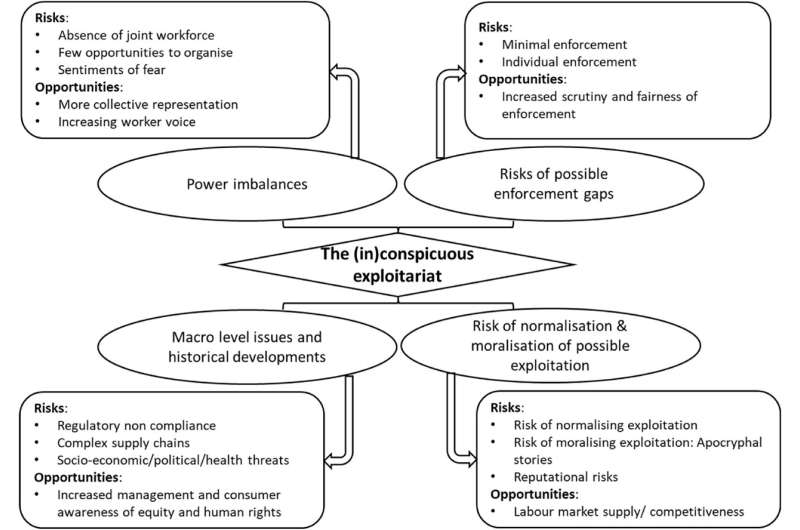This article has been reviewed according to Science X's editorial process and policies. Editors have highlighted the following attributes while ensuring the content's credibility:
fact-checked
trusted source
proofread
Calls for reform to manage potential risks of modern slavery in the UK's hospitality industry

The UK's tourism and hospitality industries, having a high concentration of migrant workers, face complex challenges in managing the risks of labor exploitation and modern slavery—according to a study from the University of Surrey.
The possible risk indicators for modern slavery are due to a potentially vulnerable workforce, fragmented franchising, oversight challenges, and seasonal/temporary working arrangements.
Researchers have introduced the concept of the "(in)conspicuous exploitariat," highlighting the delicate balance between (dis)empowerment and the risks and opportunities within these vital sectors.
The study identifies three major drivers contributing to the risks of labor exploitation and modern slavery for the UK's tourism and hospitality industries:
- Power imbalances are exacerbated by multi-tiered recruitment, precarious contracts, and scarcity of opportunities for workers to organize, with unionization levels remaining low.
- Larger hotel chains recognize modern slavery and exploitation as risks, but more explicit attention to the issue is required.
- Insecurity among migrant workers adds another layer of vulnerability, making workers potentially reluctant to seek help or assert their rights.
Professor Karen Bullock, lead author of the study and Professor of Sociology at the University of Surrey, said, "Our research has shed light on the vulnerability of workers in these industries and the potential threats arising from evolving employment models. It's crucial for policymakers and employers to take note of these findings for informed decision-making and risk mitigation."
While the UK government acknowledges the importance of combating exploitation, the study highlights potential institutional misalignments and governance gaps, advocating for a more nuanced understanding of labor issues in domestic supply chains.
Researchers analyzed data from interviews with industry professionals and stakeholders to unravel the complexities faced by the hospitality industry.
Professor MariaLaura Di Domenico, co-author of the study and Professor of Entrepreneurship, Work, and Organisation at the University of Surrey, said, "Collective action—from policymakers shaping regulations to businesses fostering best practices—can help to empower workers and ensure that exploitation has no place in our societal fabric."
The study also highlights the importance of recognizing and commending hotels and other hospitality organizations that adopt exemplary employment practices, potentially serving as models for the industry. As consumers become more informed, managers are urged to exchange information on best practices and take proactive steps to minimize potential risks associated with modern slavery and labor exploitation.
The paper is published in the journal Tourism Management.
More information: K. Bullock et al, Under the radar? Modern slavery and labour exploitation risks for the hotel industry, Tourism Management (2023). DOI: 10.1016/j.tourman.2023.104857
Provided by University of Surrey




















